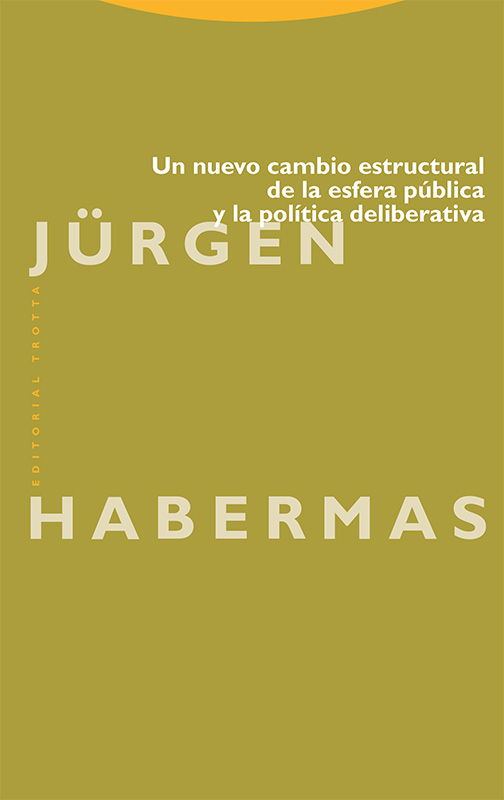Professor Jürgen Habermas (1929), almost at the end of his life, has become the teacher of a whole generation of thinkers committed to achieving a global ethic for this new civilization that is emerging at the beginning of the new millennium, and which is in great need of a balance between faith and reason and of the unity of the sciences on the basis of a common anthropology.
That this common ethics that is being sought should be open to transcendence is a sign of great common sense and open-mindedness, since for twenty-first centuries there have been many men and women of great intelligence who have lived in accordance with their faith in a divine revelation that is in accord with the dignity of the human person and therefore worthy of being taken into account. Indeed, the transcendence of man, in the philosophy of the limit, enriches the dignity of the human person, a transcendental matter for building the common home.
First, in the study we now present on the structural change of the public sphere, Habermas will refer to the concept of “deliberative politics” thanks to which democratic debate can be recovered, seeking the common good and not simply clashing or convincing the adversary, nor even considering the other as an adversary but as a stakeholder in the dialogue.
Better “public sphere” than “public opinion”.”
For Habermas, it is important to broaden the concept of “public opinion”, which is already too hackneyed and with clear traces of manipulation, and exchange it for that of “public sphere” where we can all be comfortable.
Logically, Habermas will recall from the beginning of his presentation how society has changed since the fall of the Berlin Wall, the end of communism and, at the same time, the collapse of the welfare civilization, since we are heading towards an atrocious individualism and also towards excessive tax burdens by the State to maintain the excessive social charges, social security contributions and pensioners' money. Finally, he will point out that we are still in a democratic capitalist society but prone to constant financial crises.
Strengthening democratic and legal concepts
He will then state that the foundations of the democratic and legal concepts on which we base the edifice of the State and the structures of power must be strengthened: “With the Declaration of human rights and fundamental rights, the essence of rational morality migrated to the medium of imperative constitutional law, constructed on the basis of subjective rights”.
He will therefore point out some deep contradictions that we experience in today's society: “with the secularization of state power a legitimacy vacuum arose. Since in modern societies the legitimizing power of faith in the divine election of the ruling dynasties was no longer sufficient, the democratic system had to legitimize itself from within itself.”.
Christian Humanism
It is interesting to note that Christian humanism had the potential to help post-war society in the universal declaration of human rights, since they were able to legitimize them in theological anthropology. Man “is the image and likeness of God”, and therefore, in the 1948 declaration of human rights, human rights were legitimized in human rights, that is to say, they were self-legitimized, based on human dignity and on a universal rational consensus.
Let us return immediately to Habermas to recall that “The close relationship between social status and electoral participation is well documented (...). It only works as long as democratic elections lead to the correction of serious and structurally entrenched social inequalities”.
Habermas will then conclude his argument by leaving the issue up in the air or in abeyance: “for the time being there is little to say in favor of the desirable policy shift towards a sociological agenda aimed at further integration of the European core”.
Importance of the media system
He will immediately tackle the great problem of the unity of interests in political life and the importance that communication and states of opinion are acquiring in the public sphere.
It is logical that he pauses to note: “the media system is of crucial importance to the role of the political public sphere as a generator of competing public opinions that meet the guidelines of deliberative politics.”.
Indeed, much of the structural change in the European Community, for example, is based on the media, advisory cabinets and ways of exposing different attitudes: “since the emergence of media societies, nothing has changed significantly in the social basis of such a separation between the public sphere and the private spheres of life. (...). Moreover, there is a growing tendency to move away from the traditional perception of the political public sphere and politics itself”.
Several interviews
Next, the editor of this book brings together several interviews with Habermas, which may help us to understand some of the concepts he has pointed out in the first part of his work.
For example in some answers, he will take up some of the issues pointed out and outline such important matters as the following: “in political disputes we improve our convictions and get closer to the right solution of problems”.
We find the following important: “most political decisions are based on compromises. But modern democracies combine popular sovereignty with the rule of law”. Almost at the end Habermas will point out, as a constitutive requirement, the importance of “rationalizing political power through democratic control and critical debate”.
A new structural shift in the public sphere and deliberative politics








